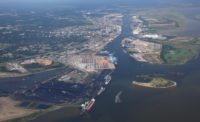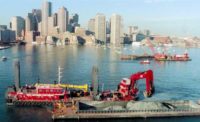The Army Corps of Engineers is exploring the idea of a new type of contract package to deepen channels at multiple ports in the same region.
Lt. Gen. Todd Semonite, the Army’s Chief of Engineers, told a Senate Environment and Public Works Committee hearing on Oct. 23 that the Corps is investigating a “multi-port dredging concept.”
Semonite added, “We believe that cost and time savings can be achieved through a regional multi-purpose approach implemented over a multi-year time frame.” [View Webcast of hearing here.]
Corps dredging contracts typically are focused on single sites at a time, with specific funding.
Semonite was referring to a recent proposal for a multi-port dredging plan from the Senate Appropriations Committee.
The committee, in its report accompanying its fiscal 2020 spending bill covering energy and water programs, directs the Corps to launch “a multi-year dredging demonstration program within the Central Gulf Coast Region.”
The panel, which approved the energy-water spending bill on Sept. 12, included $525 million in the 2020 bill in the Corps’ construction account to carry out the dredging program. It would fund deep-draft dredging projects on the Gulf Coast between Louisiana and Florida.
The committee said, “Key features of the program will explore innovative ways of executing dredging in a logical, sequenced manner, unconstrained by more traditional project-specific, [budgetary] account-specific or single-year restrictions.”
Funding is not assured, however, for the envisioned program.
Appropriations are key
Appropriations for fiscal 2020 have been stuck in the Senate for weeks and the Corps and all other agencies are operating under a stopgap continuing resolution that extends through Nov. 21.
The full Senate has yet to act on the 2020 energy-water bill. If it does eventually pass the measure and the dredging program language stays in the bill, that legislation would have to be reconciled with the version that the House passed in June. The House bill doesn’t include the dredging program.
John Doyle, special counsel with law and lobbying firm Jones Walker LLP, says that if the test is launched and is successful, it might also be useful on other types of Corps projects beyond port dredging.
Doyle, a former senior Army civil-works official, said in an interview, “If the purpose is to identify efficiencies and save dollars by eliminating inefficiencies, then I think that this will have carryover benefit and can be replicated, at least conceptually, across the whole family of Corps of Engineers project missions
He adds, “I think part of the motivation of this effort on the part of the Corps and the Senate Appropriations Committee is to begin to better identify the magnitude of the savings that can be achieved by more efficient funding as projects are being constructed.”
Jim Walker, American Association of Port Authorities director of navigation policy and legislation, said in an email to ENR, “There have been recurring issues with maintenance dredging on the Mississippi River, where the number of dredges needed to maintain navigation frequently results in dredges being pulled from other work.”
Walker added that the Corps/Senate Appropriations approach “seeks to address the annual ‘emergencies’ and provide a new tool for more flexible and cost-efficient hopper dredging.”
He also pointed out that the contract would have to have “close coordination” among Corps district offices on the Gulf Coast, which include New Orleans, Mobile and Jacksonville.
William Doyle, Dredging Contractors of America chief executive officer, told ENR via email that his group supports the multi-port proposal. He says the program's focus would be on the Southwest Pass of the Mississippi River. (Bill Doyle and John Doyle are not related.)
Bill Doyle notes that the Mississippi has flooded about 21 times in the past 24 years. He says the most recent flood, which extended from Dec. 28, 2018, to Aug. 10 of this year was the longest known flood on record on the lower Mississippi.
Doyle adds, "The Mother River is predictable....Therefore, we should prepare for the annual flood not as an emergency, but rather, as an annual event."
As Bill Doyle describes it, the idea would be for the Corps to contract for a hopper dredge before a flood actually hits. It would work initially in another area around the Gulf. If an early flood occurs on the lower Mississippi, the dredge would head there to clear any shoaling. He adds that the Corps, the dredging company and ports all would "understand that the ultimate mission of the contracted dredge is the Mississippi flood."






Post a comment to this article
Report Abusive Comment